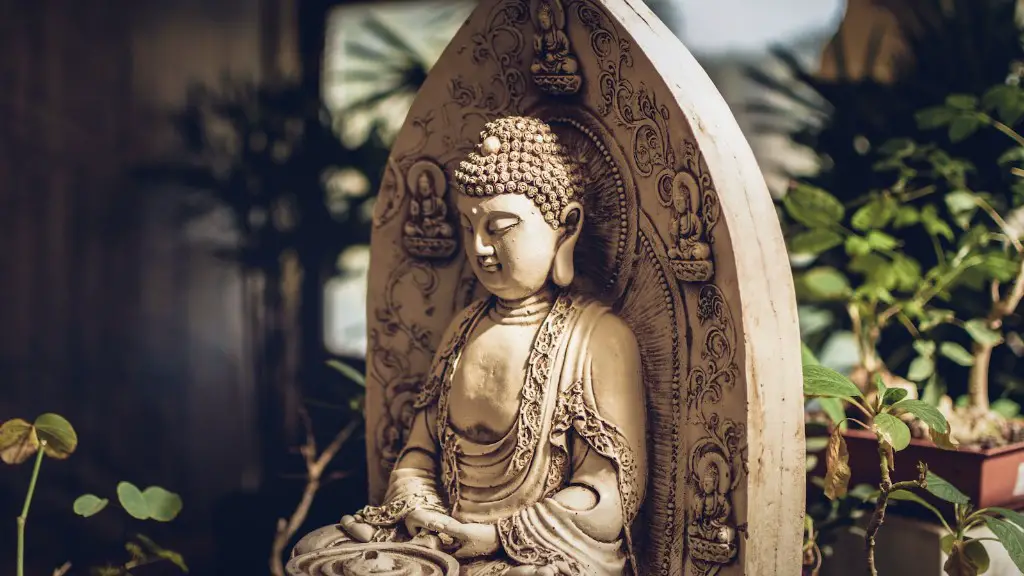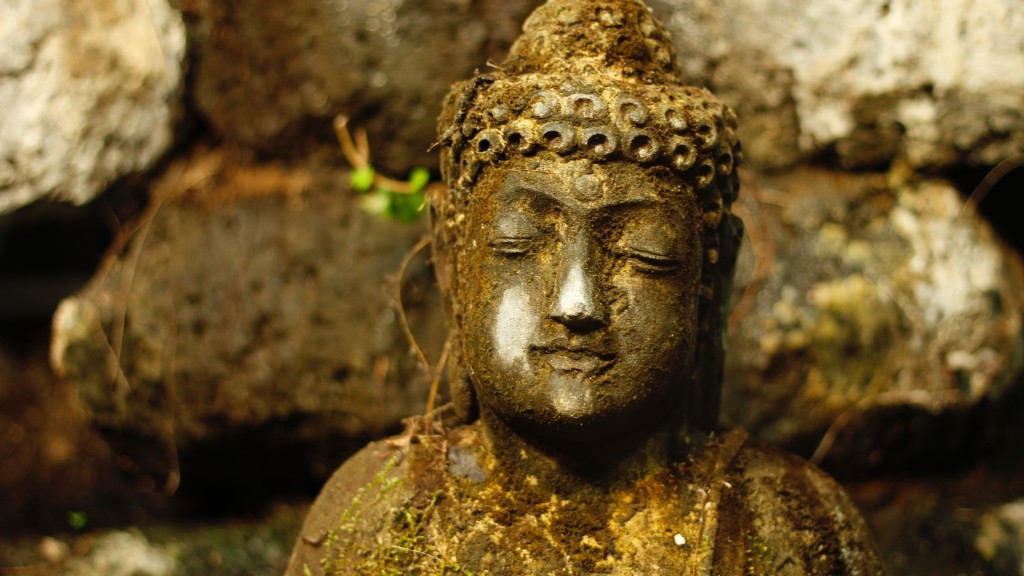Hinduism is one of the oldest and most diverse religions in the world. It is practiced by over one billion people, mostly in India and Nepal. Hinduism is an ancient religion with a very complex set of beliefs. These beliefs manifest in different forms, such as gods, rituals, ceremonies, and philosophical doctrines. Even though Hinduism is often a misunderstood religion, its core beliefs can be found in the ancient texts known as the Vedas and Upanishads.
The Vedas have been the source of inspiration for Hindus since the beginning of the religion. Written in Sanskrit, they are the oldest and most significant religious texts in the entire world. They include large collections of hymns dedicated to various gods, hymns to appeal to them and instructions for rituals, ceremonies, and sacrifices. The Upanishads are collections of philosophical thoughts, truths, and ideas; they are the basis for many of the major Hindu teachings. Both Vedas and Upanishads contain the philosophical basis for Hinduism.
At the core of Hinduism is the belief in the cycle of life and death, forming the foundation of the religion. Hindus believe that everyone goes through a continuous cycle of cycles, with death leading to rebirth, and life leading to death. As such, Hindus strive to maintain a higher level of karma, or good deeds, so that in the next life they will be born into a higher station. Hindus also believe in many gods, with the primary one being Brahman, who is the omnipresent, eternal, and Supreme Being.
Maybe
Hindus also believe in dharma, or the right path and righteousness. Dharma is a moral and metaphysical force that enables people to fulfill their purpose in life and to achieve their highest potential; it is an essential part of achieving salvation and a proper life. Other beliefs include ahimsa, or non-violence, and respect for all living things. Hindus also practice a variety of rituals and ceremonies to honor their gods and to fulfill their religious obligations.
Hinduism is an incredibly vast and complex religion, with a wide variety of beliefs and practices. All Hindus, however, share a few core beliefs. These include the cycle of life and death, the presence of multiple gods, and the importance of dharma, ahimsa, and respect for all living things. These core beliefs form the basis for many Hindu doctrines, rituals, and ceremonies.
Monism in Hinduism
Monism, or the belief in the fundamental unity of existence, is a major part of Hinduism beliefs. Hindus believe that Brahman is the all-encompassing Supreme Being and the ultimate source of all existence. Everything in the universe and beyond is part of Brahman and is indistinguishable from it. Monism has been integral to Hinduism and is a basis for its beliefs and philosophy.
Hindus also believe that the distinctions between the various manifestations of existence, such as the distinction between people and things, are only temporary and superficial. The essence of everything is the same, and all of existence forms part of the all-encompassing Brahman. This belief allows Hindus to accept and respect the differences between all of creation while still recognizing the underlying unity of all existence.
The belief in monism allows Hindus to accept and value diversity, as all of the differences between people are only temporary and superficial when viewed from a higher perspective. All faiths, cultures, and beliefs can be embraced as part of the same divine and eternal truth. Monism is fundamental to Hinduism, and it provides the basis for many of its philosophical doctrines.
Hindu Ethics and Morality
Hinduism is more than just a set of beliefs – it is also a way of life. In Hinduism, morality and ethics are based on the belief in dharma, or righteous living. According to Hinduism, in order to lead a successful and happy life, people must live in accordance with their dharma and strive to maintain the highest level of karma.
People must always act ethically and in accordance with their values and beliefs. They must respect and honor the beliefs of others, avoid violence and evil, embrace kindness and generosity, and work to help others. Hindus also emphasize the importance of controlling one’s desires and living a life of moderation.
Hindu ethics are essential for living a good and productive life. They provide the basis for moral and ethical behavior and ensure that people can live in harmony with each other and with nature. Hindus strive to live a moral and ethical life by following their dharma and ensuring that their actions are in accordance with the highest principles and values.
Hindu Aesthetics
Hindus have a deep appreciation for beauty and the arts. Music, architecture, sculpture, painting, and dance are all considered highly important and are revered in Hinduism. Hindus believe that the beauty of the arts is a reflection of the beauty of the divine. They also believe that the aesthetic beauty of the arts can lead people to a higher spiritual understanding.
Hindu aesthetics is based on the belief that beauty lies in the experience, not in the object. This means that the beauty of the art is found in the way it is experienced by the viewer. Hindu aesthetics emphasizes the importance of the aesthetics of motion and the idea that the experience of beauty lies in its appreciation and contemplation.
Hindus strongly value the aesthetic arts and the beauty they can produce. The aesthetic beauty of the arts can bring people joy and inspire them to achieve a higher spiritual understanding and appreciation of the divine. Aesthetics in Hinduism are an essential part of the religion and are deeply valued by Hindus.
Symbolism in Hinduism
Symbolism is a major part of Hinduism, and Hindus use many symbols to represent their beliefs and practices. Many Hindu symbols represent gods, goddesses, and spiritual concepts or ideas. The most important symbol in Hinduism is the Om, which is a representation of Brahman, the ultimate source of all existence.
Many other symbols represent elements of Hindu mythology and religion. The swastika is a symbol of good luck and prosperity, while the trident is a symbol of Shiva, the great god of destruction. The conch shell is a symbol of shakti, or the divine feminine energy, and the garland of skulls is a symbol of liberation. Symbolism is integral to Hinduism, and symbols are deeply revered.
Hindus use symbols to represent their faith and to remind them of their beliefs. The symbols provide spiritual inspiration and help Hindus to focus on their spiritual journey. Hindus also believe that symbols are a source of power and can be used to invoke divine energies during rituals and ceremonies. Symbols are an essential and vital element of Hinduism.
Meditation in Hinduism
Hinduism is also known for its emphasis on meditation as a way of attaining spiritual enlightenment. Meditation is seen as an essential part of spiritual growth and a means of achieving a higher level of consciousness. Hindus practice various forms of meditation, such as mantra meditation, concentration meditation, and mindfulness meditation.
Meditation has been an integral part of Hinduism since ancient times; it was mentioned in the Vedas, the ancient Hindu scriptures. Meditation helps Hindus to understand their spiritual nature and to draw closer to Brahman. Meditation is seen as a means of attaining peace, tranquility, and insight.
Meditation is an important part of Hinduism, as it helps people to connect to their spiritual nature, to understand their true purpose in life, and to achieve a state of inner peace and tranquility. Hindus practice various forms of meditation in order to attain a higher level of consciousness and the ultimate goal of liberation from the cycle of death and rebirth.


